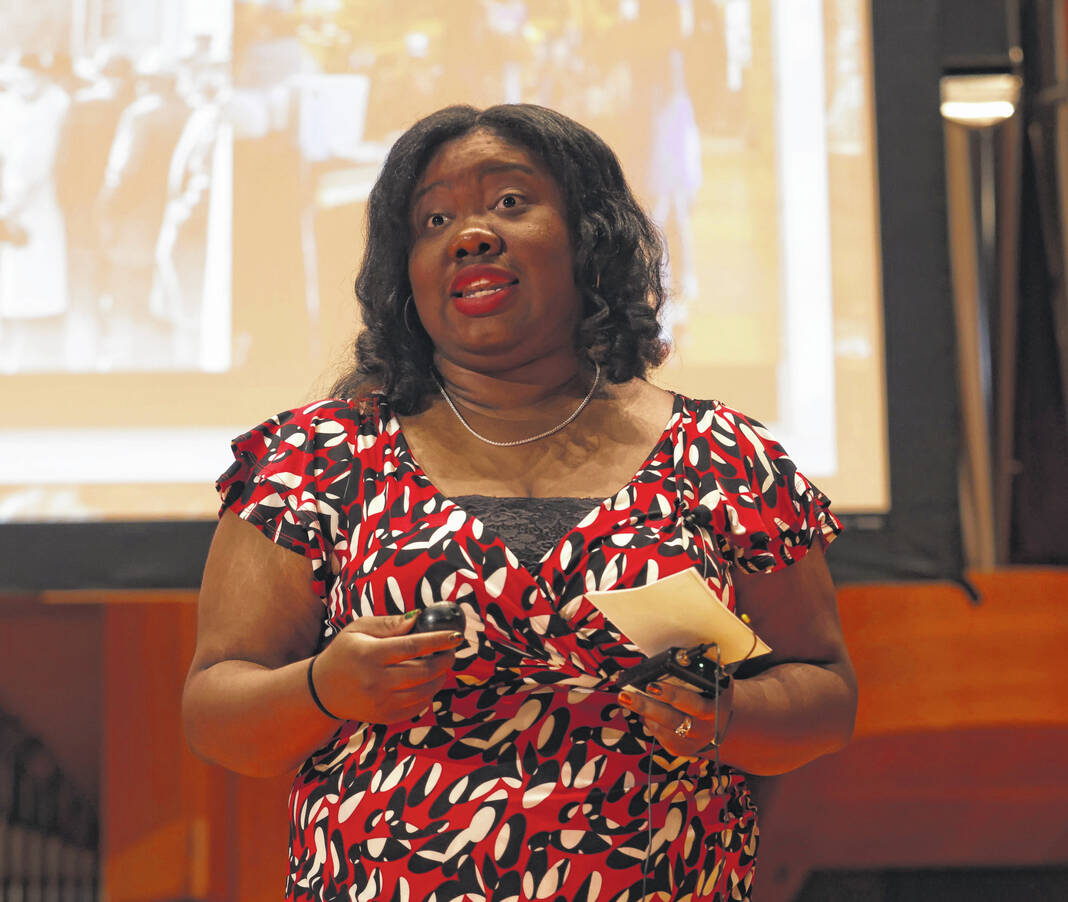
It’s not often professors are applauded for their lectures, but Ohio Wesleyan University students did just that 10 times in an hour at Gray Chapel on Monday.
That’s because one of the most popular events on campus has returned — the i³ lectures. It stands for Ideas, Insight, Imagination in three minutes. It’s pronounced IQubed, as in IQ.
Emcees Kathy Habian (class of 2025) and Deshawn Rode (class of 2024) joked that all their classes should be three minutes long. They said these lectures are outside the box and inside the clock. Think of them as truncated yet thought-provoking TED talks.
How it works: The prior year, students voted on which professors they want to hear speak at the sixth edition of i³. Each professor got on stage and gave mini lessons that were three minutes long. Each professor received a rousing ovation from the nearly full auditorium before and after they spoke. At the end, the students left to get a boxed lunch.
First up was Laurie Anderson (biological sciences), who spoke on “What Plants Know.” She read a passage from “Game of Thrones,” which intimated leaves seemed to be alive. They of course are, but we tend not to notice plants, Anderson said. She said plants can sense danger, their neighbors, and pollinators. “They know more than you think,” Anderson said.
Amy Butcher (English and creative writing) spoke on the killing of Breonna Taylor by police. Butcher asked, “How can the punishment for extinguishing a spirit be nothing?” She answered that our responsibility is to ignite a light on that spirit, and cited the words of Chanel Miller, another victim of violence.
Bob Harmon (physics and astronomy) used humor to explain “Dark Matter and the OWU Connection.” He noted that unseen dark matter has gravity, and there’s five times more of it than there is baryonic matter (which includes us and observable objects). Harmon said that the Perkins Observatory telescope played a role in studies that confirmed the existence of dark matter.
Vanessa Hildebrand (sociology and anthropology) spoke of her experiences spending 20 years in Indonesia. Using the metaphor of you are what you eat, she said Indonesians eat sambal, a sauce, for every meal and snack, and each family makes it their own way. She gave her recipe for sambal kacang, saying people may as well make it (and their lives) spicy, instead of bland.
Craig Jackson (mathematics and computer science) demonstrated “How to Build Everything from Nothing.” He explained the difference between natural numbers, rational numbers, real numbers, (along with more complex functions) and how they can be defined as sets.
Sarah Kaka (education) spoke on “To Protect Democracy, First Save Teaching.” She said that schools have become battlegrounds through public perception and pending legislation, even in Ohio. This has resulted in fewer people wanting to be teachers, and more uncertified people taking teaching jobs. Kaka said those that are teaching are overworked and undervalued, and more than half are considering leaving the profession in the next couple years.
Brianna Mack (politics and government) used the lyrics of a Kanye West song to illustrate “What’s a Mob to a Politician?” Mack said that collective action gets things done, good or bad, but that voting is the most effective way. “Incumbents only want their supporters to vote,” she said. Mack rewrote the lyrics of “No Church in the Wild” to end with “No Politricks in the Wild.”
Antron Mahoney (Africana & gender identity studies) said that in the wake of the Black Lives Matter movement,“Leadership Is Not Enough: The Need for Justice-Oriented Relationships.” He said that’s a long-term way to make structural changes to outdated cultural institutions such as the “Great Man Theory,” as opposed to emphasizing short-term results that aren’t permanent.
Christopher Modica (psychology) gave an imaginary case study on obsessive-compulsive disorder, a middle-aged woman who can’t leave her home without making sure all the lights are off. “The more checking, the more the anxiety grows, and the more intrusive fears become,” he said. “It can be crushing.” However, instead of avoiding the behavior, Modica said people should slowly face it to find out it wasn’t so bad, and that one can tolerate uncertainty.
Julide Yazar (economics) noted that a third of us are struggling to make decisions since the pandemic. She used a quote by the philosopher Soren Kierkegaard, “Think Backward to Move Forward,” or by starting at the end of a process. She demonstrated this with a thought experiment involving three lions, a lamb and tall grass.


